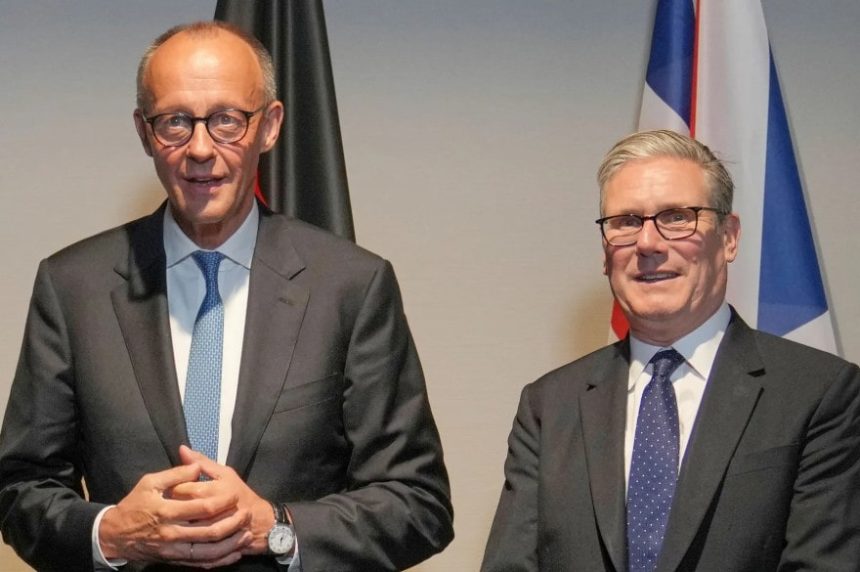Starmer Merz Agreement: UK and Germany Unite Against Smugglers in Historic Treaty
A landmark UK-Germany treaty is set to be signed at Downing Street this Thursday, marking a turning point in post-Brexit diplomacy and border security.
Keir Starmer, the British Prime Minister, is hosting German Chancellor Friedrich Merz to formalise a new pact aimed squarely at smuggling gangs, defence collaboration, and industrial cooperation.
This isn’t just another handshake. It’s a strategy. Dubbed the “bilateral friendship and cooperation treaty”, the deal goes beyond symbolic gestures. It brings teeth to Starmer’s push to reassert Britain’s influence across Europe—without reopening old EU wounds.
At the core of the agreement? A firm German commitment to criminalise the facilitation of unauthorised migration to the UK. Officials say the move strikes at a critical point in the smuggling chain, particularly routes running through Germany.
The new law, expected to clear German parliament by year-end, will empower law enforcement to dismantle the infrastructure behind illegal Channel crossings.
“Police will be able to raid warehouses, seize assets and arrest facilitators even where no migrants are present,” UK officials confirmed. This could, they say, upend the logistics behind the dangerous boat journeys.
Though Merz assumed office in May, this is his first official visit to London—a delay, both governments say, was intentional. It was designed to coincide with this treaty’s announcement.
Back in his first week, Merz travelled to Kyiv with Starmer, French President Emmanuel Macron, and Polish PM Donald Tusk. That display of unity signalled a new rhythm of European coordination, and Thursday’s meeting appears to be a follow-up beat.
Security dominates the agenda. The treaty underlines a shared view: “There is no strategic threat to one which would not be a strategic threat to the other.” The two nations will deepen cooperation against cyber threats and hybrid warfare, without stepping on NATO’s toes.
A senior German official was quick to clarify, “This is not intended to replace NATO or any future UK-EU security frameworks. But let’s be honest—Brexit left gaps. We’re filling them.”
This UK-based treaty reaffirms joint ambitions laid out in the Trinity House Agreement, particularly on long-range weapons development. But it also aims to reconnect people, not just policies.
“We will enable visa-free school group travel between the UK and Germany,” one German official said. “We’ll introduce the new programme by the end of 2025.”
The plan includes setting up a joint expert group to expand educational and cultural mobility, targeting universities, research institutions, and political forums. While exclusive to the UK and Germany for now, it may serve as a blueprint for future EU-UK partnerships.
Though not on the official docket, the shadow of Donald Trump looms large. Sources say his recent remarks on Russia could come up privately, especially with growing European concerns about NATO unity and US reliability in a shifting global order.
One official put it bluntly: “This is about adjusting and renewing the UK-Germany relationship. The world’s changing. So must we.”
Zoom out, and this treaty is part of a bigger dance. Starmer is moving quickly—fresh off recent agreements with France, now locking arms with Berlin. Analysts point to a subtle revival of the E3 trio: Britain, France, and Germany stepping up joint action on migration, defence, and global strategy.
For Merz, it’s also a chance to stabilise his shaky CDU/CSU-SPD coalition back home. As Germany battles economic stagnation and rising far-right pressure, this high-profile visit offers a narrative of control, competence, and continental partnership, outside Brussels’ orbit.
The Starmer-Merz agreement is more than a treaty. It’s a statement. One that says the UK and Germany aren’t just allies—they’re strategic partners with shared threats, shared values, and shared ambitions for a safer, smarter Europe.






